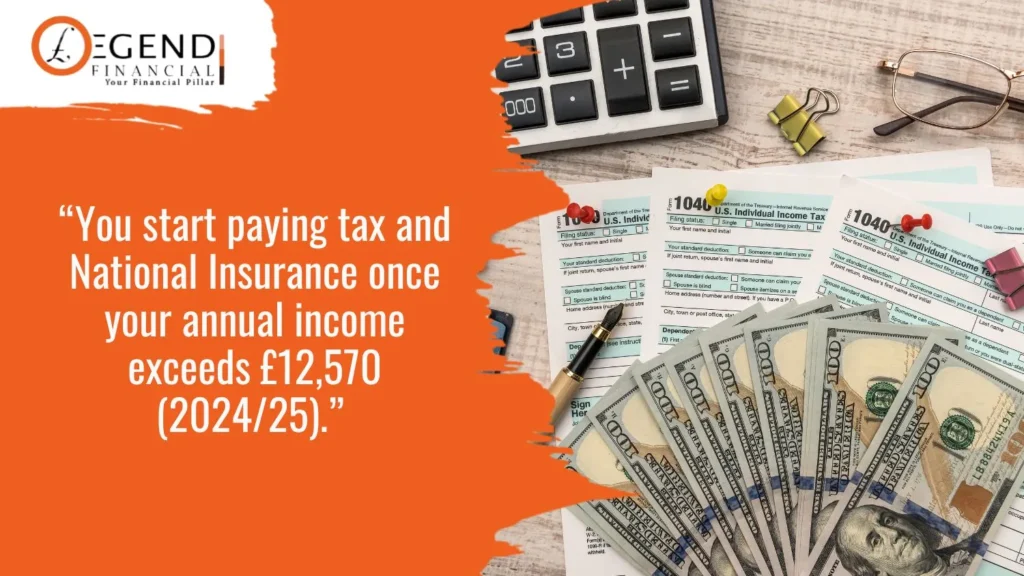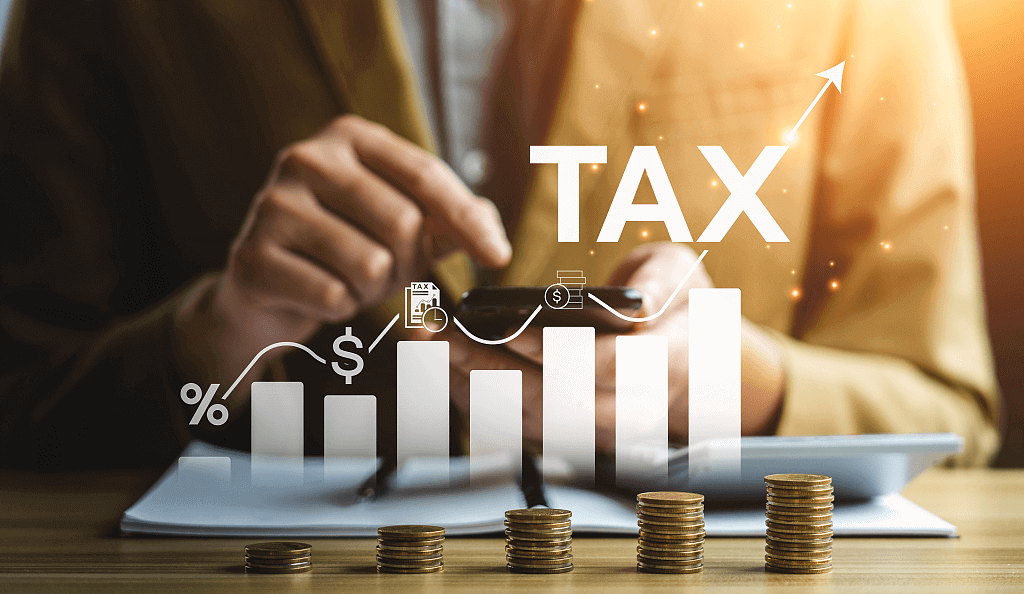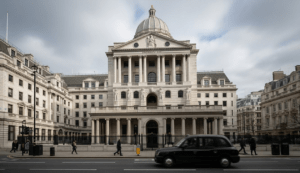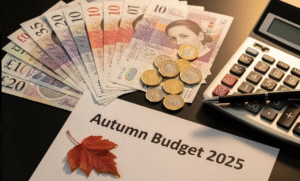Contents
Knowing when you start becoming liable to tax is crucial, especially if you are self-employed where self assessment is mandatory upon hitting the income threshold. Even if you are an employee, it is just as important to stay on top of your paycheck and budget.
Whether you are self-employed or employed (or both), we answer this common question among our clientele—when do I start paying tax?—and other things you need to know. Read on.
When Do I Start Paying Tax UK: 2024 Overview
Everyone pays income tax, regardless of employment status (except for corporations). For the 2024/25 tax year, you can earn up to £12,570 before paying tax, which is your current tax-free allowance. You will also be liable to National Insurance at varying thresholds and rates.
Other types of income you may have to pay tax on include:
- capital gains
- dividend income
You can be both employed and self-employed at the same time. The main difference is how you are taxed. If you are merely employed, your tax is already handled at source (from your payroll) via the Pay as You Earn (PAYE) system. If you are also self-employed (or completely), you will need to file a self-assessment tax return to HMRC.
Learn how to register in 5 minutes as self-employed with this guide.
When Do You Start Paying Tax on Wages? [Employed]

You pay tax and National Insurance contributions when your wage or salary exceeds the personal tax allowance of £12,570 (2024/25), both automatically deducted from payroll. If you also earn outside employment, these incomes count toward your total taxable income.
- Income Tax
Most employees in the UK fall within the basic rate tax bracket. Current income tax rates are as follows:
-
- Basic Rate (20%): Incomes between £12,571 and £50,270
-
- Higher Rate (40%): Incomes between £50,271 and £125,140
-
- Additional Rate (45%): Incomes over £125,140
If you have other sources of income, that may move you up to the higher tax brackets. The UK follows progressive taxation, which means you pay tax at the lowest tax bracket before moving to the next tax slabs.
- Class 1 National Insurance (NI)
Employees pay Class 1 National Insurance (alongside their employer’s contributions) once they earn over £242 per week. NI revenue goes to the NHS, state pension, and other social security benefits.
Read relevant article: how much you can earn before you start paying tax?
When Do I Start Paying Tax Self Employed?
If you also earn outside employment (e.g., rental income or other side hustle), you will have a trading allowance of £1,000 on top of your personal tax allowance before paying income tax. Self-employment income, alongside your wage (if also employed) count toward your overall income tax bill.
Once you exceed the trading allowance, you will need to register as self-employed and pay tax to HMRC through self-assessment. Be sure to use your allowable expenditures to reduce your taxable income.
- National Insurance (NI)
As self-employed, you pay Class 2 National Insurance if you earn over £6,725 in a year. More than £12,570, you will pay Class 4 National Insurance. Class 2 NI, however, is now optional. You may continue paying it to increase your National Insurance contributions and maintain your eligibility for state benefits.
When Do I Start Paying Tax on Savings and Investments?
Thresholds vary depending on the kind of investment and savings. Savings, such as Individual Savings Account or cash ISAs, are considered the most tax-efficient, as they are free from tax. See below much tax you might pay on your investments.
- Tax on Capital Gains
You pay tax on your capital gains over £3,000. For common types of investments, here’s how much capital gains tax you pay made from 30 October 2024:
-
- 24% – residential property gains
-
- 28% – ‘carried interest’ gains (investment funds)
-
- 24% – other chargeable assets’ gains
CGT Tip: Consider the timing of selling assets. Spreading the sales over multiple tax years can help you remain within the annual exempt amount.
Did you know about the Entrepreneurs Relief for 2024? Read our blog and check if you qualify!
- Tax on Dividends
In the 2024/25 tax year, you start paying dividends tax on most savings when it exceeds £500. Any dividends you earn over this amount are taxed based on your income tax band:
-
- Basic Rate: 8.75%
-
- Higher Rate: 33.75%
-
- Additional Rate: 39.35%
Salary and Dividend Mix: To minimise income tax and National Insurance contributions, consider drawing a portion of your income as dividends rather than salary. This can lead to tax efficiencies if done correctly.
- Tax on Inheritance
If you receive an inheritance, whether money or property, you will be taxed 40% when this exceeds the £325,000 threshold. Make sure to use this allowance effectively with proper estate planning.
Annual Gift Exemption: You can gift up to £3,000 each tax year without it counting towards your estate’s value for inheritance tax.
Other Tax-Efficient Tips
- Any gains from investments held in an Individual Savings Account (ISA) are free from CGT. Max out your ISA allowance each tax year.
- If you have made losses on some investments, offset these against any gains to reduce your CGT liability.
- If you have family members who are lower earners, consider gifting shares to them; they can then draw dividends up to their tax-free personal allowance.
- Placing assets in a trust can help to mitigate inheritance tax liabilities, but ensure you understand the rules and implications.
- Participate in salary sacrifice schemes for benefits like pensions or cycle-to-work to reduce taxable income.
- Contributing to a pension not only saves you for retirement but also reduces your taxable income. Contributions may be eligible for tax relief.
- For couples, consider sharing family responsibilities to maximise each person’s NI record, which can be of particular importance when it comes to pensions and benefits.
- Caveat! Tax-efficient strategies vary according to a person’s unique tax and financial position. Be sure to talk with a tax advisor about your options first before applying any tax strategies.
- For more quick tax-efficient options, check out our guide!
FAQs on UK Taxes
If you are not paying taxes on your wages in the UK, it may be because your earnings are below the Personal Allowance threshold of £12,570 per year, or you might be on an emergency tax code. Part-time or temporary work, student loans, or having multiple jobs can also affect whether tax is deducted or not.
If you earn above the Personal Allowance threshold of £12,570 per year (as of 2024), you will start paying income tax regardless of age. However, you will not be taxed if your income is below this threshold.
As a sole trader, you start paying tax on your profits once they exceed the Personal Allowance, which is £12,570 annually. Moreover, if your profits exceed £1,000, you will need to register with HMRC and complete a Self Assessment tax return. You will be liable for income tax on your profits and National Insurance Contributions (NICs) if your earnings are above the threshold.
Yes, you may pay tax for your first job if your earnings exceed the Personal Allowance threshold of £12,570 per year.
As a general rule, you will start paying income tax and National Insurance Contributions (NICs) in England and Wales when your earnings or profits exceed certain thresholds. The standard Personal Allowance is £12,570, which is the amount of income you do not have to pay tax on.
Need Personalised Tax Advice? Let’s Talk
Knowing the answer to this common question, when do I start paying tax, is the first step to being proactive with your tax affairs. Legend Financial is here to help you have a better understanding of your taxes. We have helped hundreds of individuals, families, and businesses optimise their tax and accounting department. Get personalised advice today—let’s talk!











